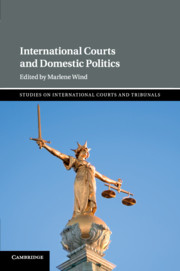Book contents
- International Courts and Domestic Politics
- Studies on International Courts and Tribunals
- International Courts and Domestic Politics
- Copyright page
- Contents
- Figures
- Tables
- Contributors
- Abbreviations
- Preface
- Introduction
- 1 ‘Missing in Action? The Rare Voice of International Courts in Domestic Politics’
- Part I
- 2 What Can Financial Markets Tell Us about International Courts and Deterrence?
- 3 The Strasbourg Court and Domestic Judicial Politics
- 4 It’s a Good Idea … Isn’t It? The Impact of Complementarity at the International Criminal Court on Domestic Law, Politics and Perceptions of Sovereignty
- 5 Rights-Protecting iCourts: The Curious Case of the OP-ICESCR
- 6 Reassembling the French State via Human Rights: Between Human Rights Internationalism and Political Sovereignism
- 7 Impact through Trust: The CJEU as a Trust-enhancing Institution
- Part II
- Index
- References
6 - Reassembling the French State via Human Rights: Between Human Rights Internationalism and Political Sovereignism
from Part I
Published online by Cambridge University Press: 23 June 2018
- International Courts and Domestic Politics
- Studies on International Courts and Tribunals
- International Courts and Domestic Politics
- Copyright page
- Contents
- Figures
- Tables
- Contributors
- Abbreviations
- Preface
- Introduction
- 1 ‘Missing in Action? The Rare Voice of International Courts in Domestic Politics’
- Part I
- 2 What Can Financial Markets Tell Us about International Courts and Deterrence?
- 3 The Strasbourg Court and Domestic Judicial Politics
- 4 It’s a Good Idea … Isn’t It? The Impact of Complementarity at the International Criminal Court on Domestic Law, Politics and Perceptions of Sovereignty
- 5 Rights-Protecting iCourts: The Curious Case of the OP-ICESCR
- 6 Reassembling the French State via Human Rights: Between Human Rights Internationalism and Political Sovereignism
- 7 Impact through Trust: The CJEU as a Trust-enhancing Institution
- Part II
- Index
- References
Summary
This chapter analyses how the growing force of particularly the European Court of Human Rights (ECHR) has reassembled the French State. It argues that the development of the relationship between France and European human rights is hardly a linear development but rather one marked by a schism between internationalism and sovereignism that is both historical and contemporary. The chapter suggests that three stages can be observed with regard to the reception of international and European human rights in France. The first period is marked by export and national refusal of international human rights as a matter of domestic politics, lasting until roughly the mid-1970s. The second period is characterised by a burgeoning domestic political interest but still marked by an autonomous domestic interpretation of rights within the legal field, lasting until mid- to late 2000s. And the third period is marked by the mainstreaming of ECHR norms – at least on substantive matters – into the French legal field. In conclusion, the analysis points to the new Euro-scepticism in France and its possible implications for the Strasbourg institutions and their role in France.
- Type
- Chapter
- Information
- International Courts and Domestic Politics , pp. 139 - 159Publisher: Cambridge University PressPrint publication year: 2018

